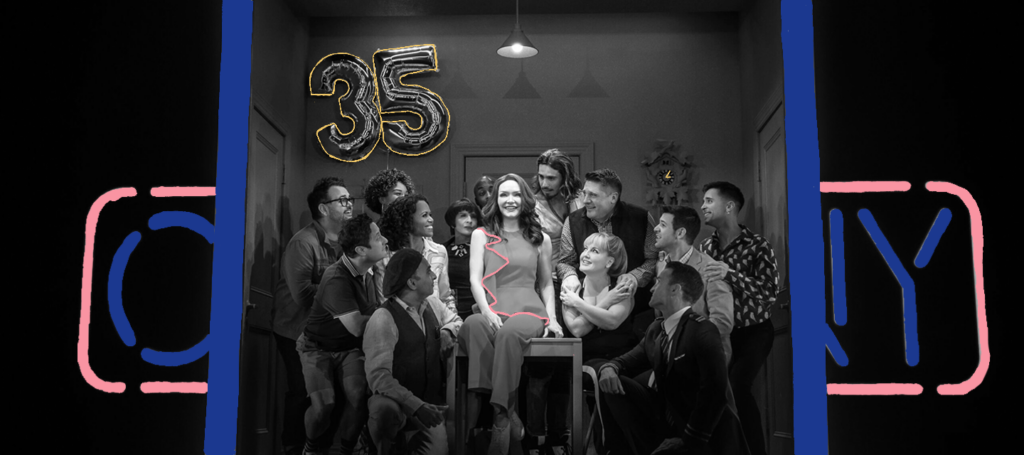


‘Company’: A Glorious Revival Revolves Around an Empty Role
It’s never a good thing when the only praise you have for the central performer in the revival of a groundbreaking musical is, “She’s very pretty.” Unfortunately, that, and a pleasant voice, are all that Katrina Lenk brings to her performance as the cipher, Bobbie, in this otherwise marvelous revival of Company.
Yes, that’s Bobbie, not Bobby. As reconceived by director Marianne Elliott, the main characters and beaus of Stephen Sondheim’s revolutionary musical about relationships have swapped their genders. The cumulative effect is that instead of watching Bobby smirk his way through a collection of marriage-based vignettes as he tries to divine what he wants, we see Bobbie descend into an existential crisis from pondering what she might lose should she be subsumed by another.
Much occurs as Bobbie decides how she feels about solitude―a sexy kung fu exhibition, divorce, wedding, proposal, proposition, a night at the club, romp in the bed with a flighty flight attendant, and a pot session―but at its core, coming to that private conclusion comprises Company’s plot.
The catalyst for all of this is Bobbie’s 35th birthday, which her friends have gathered to celebrate with a surprise party. In Elliott’s rendering, we conclude that everything before that surprise has been nothing more than a series of flashbacks within Bobbie’s ambivalent mind. These ruminations coalesce into madcap jaunts through realistic scenes that often break into zany dream logic―though with Bobbie always serving as a captive audience and rarely the main event.
Bunny Christie has helped Elliott move the musical’s constantly churning engine bubbling along by devising a fantastic set design that sends Bobbie scrambling down a literal rabbit hole, fleeing through modules that roll on and connect into living comic book panels―or warping into wonderfully appointed modern apartments, complete with secret entrances.
Elliot receives additional essential assistance in maintaining that energy from Joe Fram’s flowing musical direction and Liam Steel’s vivacious choreography, which―much like the original production’s choreographers, Michael Bennett and Bob Avian―enhances rather than distracts from the action.
This was most obvious during the “Tick-Tock” dream sequence between Bobbie and her dim flight attendant Andy (Claybourne Elder who transforms playing a bimbo into high comedic art). During this moment, Bobbie sees the potential lives she might lead were they to make a go of it. Regardless of the incarnation, she always treasures being alone.
But what of the supporting cast? They are all uniformly wonderful. From Nikki Renée Daniels’ soaring soprano and easy-going (but stay away from my man) Jenny, to Patti LuPone’s insecure though devastating zinger-slinger Joanne, and Jennifer Simard’s never-ending comedic variations of “shut-up” as Sarah. The switch from women’s voices and perspectives to men’s in “You Could Drive A Person Crazy” and “Poor Baby” works wonderfully.
The only thing that Elliot has not resolved in this revelatory transformation is that Bobbie remains a side character in her own story. That is unless the performer fulfilling those shoes maintains a fascinating inner-life to pull in the audience―even as most of her material consists of reacting to the swirling craziness around her.
But then acting is reacting, and while imbibing Lenk’s aesthetically attractive presence, I often wondered “Does she know how to?” In Elliot’s staging, the central character’s drinking is more pronounced than I have seen in other productions. And while that led me to believe that Bobbie had something to hide, suppress, or drown, no hint of what that might be ever threatened to spill or boil over.
Some Bobbies are mournful, while others are caustic and bitter or overly eager and given to compensating for something they lack―Lenk’s Bobbie is the friend you bring to a party because she is innocuous and you know that she will do nothing to surprise you. While some might consider playing that a brave acting choice, it was nothing short of dull to watch.
That’s a damning statement―fortunately, Elliott’s creative team and otherwise delightful cast prove that Company can be glorious, even without a vibrant center to hold it together.
Keep Reading

‘Harry Potter and the Cursed Child’: Come for the Nostalgia, Stay for the Spectacle
The moment you walk into the Lyric Theatre the magic of the Potter world hugs you. Just as they have done in Universal Studios, with the flick of their wand, The Wizarding World of Harry Potter invites you to join them on a new expedition. The welcoming warm glow of faux candlelight, the gold-trimmed accents, […]
Read More
‘Mrs.Doubtfire’: 90’s Property Goes from Protest-able to “Just” Regressive
Last Thursday, when I stood up to applaud the boisterous, giving-all-they-got ensemble of Mrs. Doubtfire, I found myself marveling at the joy I got out of what was so clearly a cash grab. Unlike recent attempts at monetizing well-known properties & cultural touchstones (hello, Diana!). Mrs. Doubtfire is full of exciting, justifiably large musical numbers, […]
Read More












